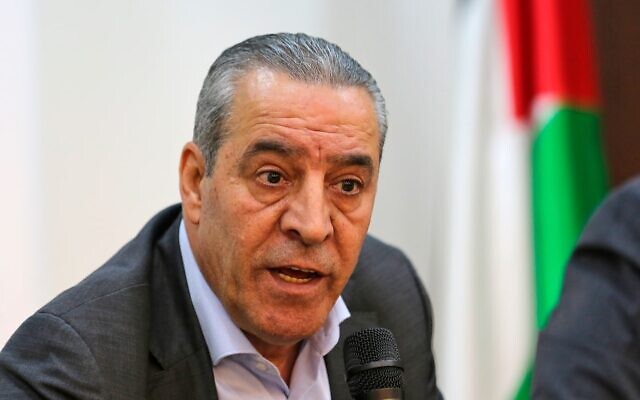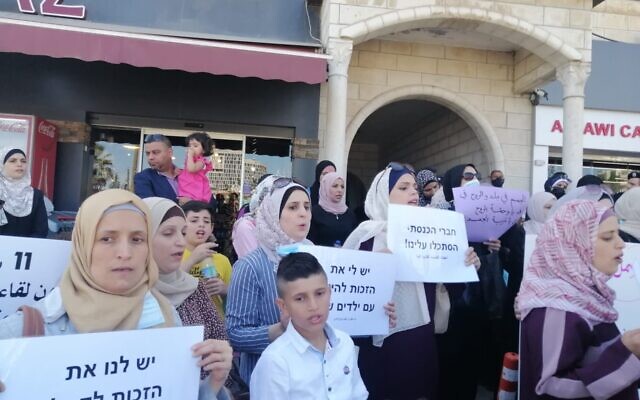T. Belman. Ganz is a putz. He is committed to stregthening the PA even though they continue to support terrorism and build illegally in Area C. Gants wants to improve “important ties we have with the Palestinian Authority, which I believe we need to strengthen,”. Gantz also got the Israeli government to loan to the PA all the money it has withheld from them.
This article is very unclear as to where these individuals are currently residing. Sometimes it says the West Bank”. Sometimes “Judea and Samaria”. Really? It should be either Area A, Area B or Area C.
It does say though Ramallah cannot issue valid identity cards on its own without Israeli approval, which has left many Palestinians unable to secure documentation.”. What is left entirely unclear is who is at fault. My guess is the the PA won’t issue residence permits in Area A or B even with Israel approval.
Move was first announced this summer as part of Defense Minister Gantz’s effort to strengthen Palestinian Authority
By AARON BOXERMAN and JUDAH ARI GROSS, TOI 19 October 2021,
Palestinians and their spouses protest to demand West Bank residency cards in front of the PA’s Civil Affairs Commission in Ramallah (courtesy: Alaa Mutair)
Israel announced on Tuesday it had officially legalized the status of 4,000 Palestinians in the West Bank, following a decade-long freeze in which almost no such requests were authorized.
The move was part of the government’s ongoing effort — led by Defense Minister Benny Gantz — to strengthen the Palestinian Authority. Senior PA official Hussein al-Sheikh said in a statement that the names of those approved would be announced later on Tuesday.
Israel’s military liaison to the Palestinians, known officially as the Coordinator of Government Activities in the Territories, said that 1,200 undocumented Palestinians would receive identity cards. Another 2,800 Palestinians registered as Gazans would receive a change of address entitling them to live in the West Bank.
The Palestinians in question live in West Bank areas where the Palestinian Authority has limited self-rule, and they will carry identity cards emblazoned with the PA’s winged eagle.
Ramallah cannot issue valid identity cards on its own without Israeli approval, which has left many Palestinians unable to secure documentation. Many have lived in the area for decades without official recognition, a situation that severely restricts their ability to move freely and forces them to live under a constant threat of deportation.
Some 442 authorizations were also announced last week by Palestinian officials; it was not immediately clear whether those approvals were included in Tuesday’s announcement.
Palestinian officials and rights groups estimate that tens of thousands more undocumented Palestinians remain in the West Bank. Some criticized Tuesday’s announcement by COGAT, saying that it did not go far enough.
“We heard recently that there were supposed to be 5,000 family unification approvals. Now we see that the number is closer to 1,200 people who will receive legal status in the West Bank. What happened to the rest of the applications? Not to mention the tens of thousands of other requests,” said Israeli attorney Yotam Ben-Hillel, who has represented undocumented Palestinians for years.

Palestinian Authority Civil Affairs Commissioner Hussein al-Sheikh. (WAFA)
On the right, hardline Israeli parliamentarian Bezalel Smotrich slammed the decision to authorize the Palestinians’ residency requests as “post-Zionist.”
“This government is irresponsible and dangerous for the future of the State of Israel,” Smotrich tweeted.
According to COGAT, some 1,200 undocumented Palestinians will be handed identity cards. These include Palestinians who were born and raised in the West Bank, but had failed to register before the cut-off age of 16, as well as others who moved abroad before the signing of the Oslo Accords and lost their residency status.
Another 2,800 are Palestinians who moved to the West Bank from the Gaza Strip before the Hamas terror group’s takeover of the enclave in 2007.
“We stress that all of the requests that were approved are on a humanitarian basis, and that any further request will be thoroughly examined in accordance with security approval from the relevant security figures in Israel. All of these cases involve Palestinians who have lived for many years in Judea and Samaria,” the liaison said in a statement, using the biblical term for the West Bank.
Israeli authorities apply different restrictions to Palestinians depending on whether they are listed as being from Gaza or the West Bank. While some Palestinians have lived in the West Bank for decades, Israeli authorities almost never approve “change of address” requests that would legally allow them to be recognized as West Bank residents.
Ammar Hils, a Palestinian who has lived in Ramallah since he was six years old, told The Times of Israel that he had been attempting to change his address from Gaza to the West Bank for years, only to be met with silence from the Israeli authorities.
“With a Gaza identity card, I can’t get a work permit to get into Israel. At one point, they caught me at a checkpoint and deported me back to Gaza, and it took me months of court battles to return to the West Bank,” said Hils, originally from the Gaza city of Khan Younis.
In August, when plans to address the issue of undocumented Palestinian residents of the West Bank were first announced, the PA’s al-Sheikh said the first people whose permits would be resolved were spouses of people who have proper documentation.
These will be “a first batch on the road to resolving this issue entirely, within the framework of an agreed-upon timeline,” al-Sheikh, a close confidant of PA President Mahmoud Abbas, said at the time.
This summer, Gantz announced several other steps to improve ties with the PA and strengthen the de facto Palestinian government: a NIS 500 million loan to Ramallah, additional building permits in the West Bank where Israel administers construction, and more work permits for Palestinians seeking employment in Israel.
Gantz’s announcement came after a meeting he held with Abbas this summer, the first such public meeting between high-level Israeli and Palestinian officials in over a decade. At a briefing soon thereafter, Gantz called for the PA to be bolstered as a bulwark against Hamas and other terror groups.
“I told Abbas that we aren’t going anywhere and that the Palestinians aren’t going anywhere. I went to the meeting in order to build confidence and preserve the interests of the State of Israel and the important ties we have with the Palestinian Authority, which I believe we need to strengthen,” Gantz said.

Defense Minister Benny Gantz arrives at a cabinet meeting at the Prime Minister’s Office in Jerusalem, on September 5, 2021. (Yonatan Sindel/Flash90)
Although Palestinian officials had promised the understandings would resolve the status of undocumented spouses of Palestinians — believed to be the most common illegal residents — an Israeli defense official said none had been approved as part of the move.
Many foreign nationals married to Palestinians have waited years or decades for residency in the West Bank. During the 1990s, the Israeli government set a yearly quota for family unification approvals, peaking at around 4,000. But following the outbreak of the Second Intifada in 2000, Israel reduced ties with the Palestinian Authority, shutting down family unification.
Between 2010 and 2018, Israeli authorities approved just five applications, the Defense Ministry told the HaMoked rights group following a Freedom of Information request.
Israel last opened the issue as a goodwill gesture to the Palestinian Authority in 2007, examining some 50,000 outstanding requests and approving 32,000, according to court filings.
As they are legally considered to be illegal immigrants, most foreign spouses of West Bank Palestinians live tightly regulated lives. They cannot open an account at a Palestinian bank or legally work in Palestinian cities. If they leave for a family visit to their country of origin, they might not be allowed to return to the West Bank, even though their spouses and children reside there.




Rereading the article, it would appear that they indeed live in A and B
“The Palestinians in question live in West Bank areas where the Palestinian Authority has limited self-rule, and they will carry identity cards emblazoned with the PA’s winged eagle.”
What threw me off was this statement, “All of these cases involve Palestinians who have lived for many years in Judea and Samaria,”
Also the title to the article referred to “West Bank residency”
If these people are not permitted to live in Area C, I am much less concerned.
Ted, my general understanding is these people live in Area A or B. Since no one is likely tracking them, one can not be positive.